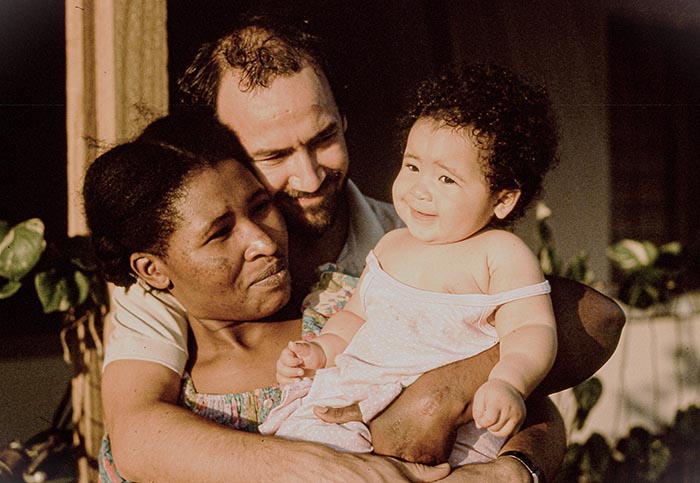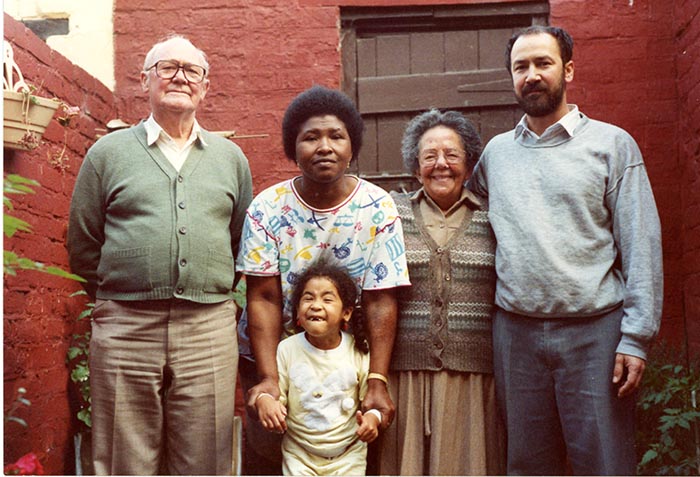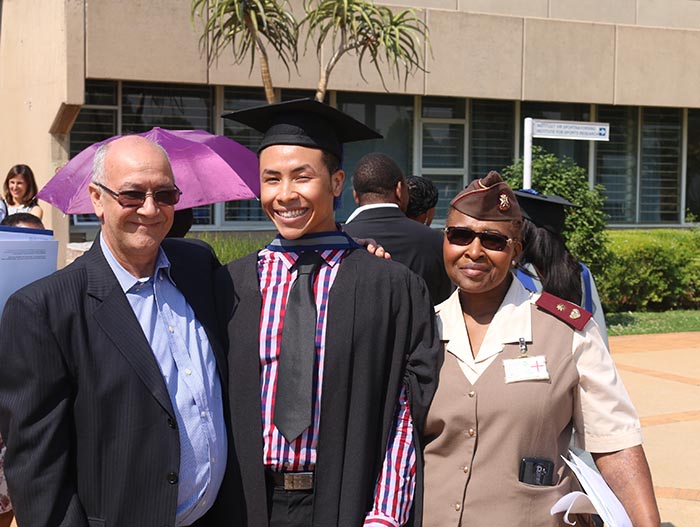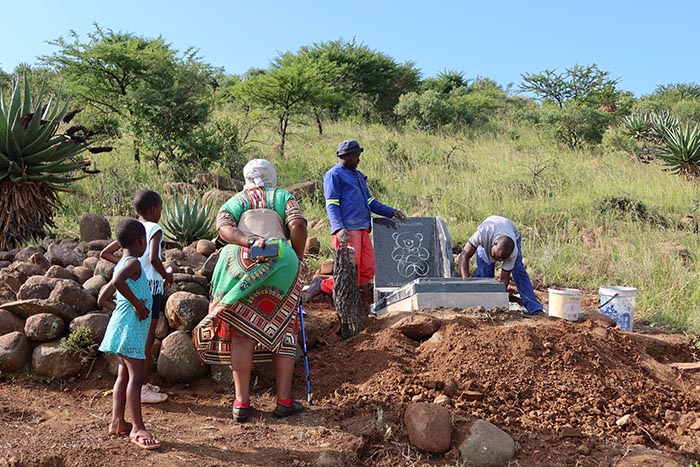John and Ntombi’s story traces a mixed race couple’s lives in exile and back home in a democratic and free, sometimes uncertain South Africa
By Edward Tsumele, CITYLIFE/ARTS Editor
When I got hold of this book last year I immediately felt that I needed to sit down with this author John Carneson and possibly his wife Ntombi Lukheleand[JC1] Nomvula Mbhele, AKA Gogo , all of whom are part of this story of love, exile and living and working in post-Apartheid South Africa.
The initial plan was that after finishing reading the book, I was going to go to their house in Centurion and have a conversation with the couple related to the stories of pain, triumph, love and challenges they personally experienced and continue to experience going back to their exile years to the contemporary times in a free country.

The couple struggles with one another because Ntombi is tough and practical why John confesses to the weakness of being dreamy and theoretical.
I was hoping that I was going to sit at the table in their Lapa, the one next to the swimming pool in their Centurion home, while I admire their garden that has fresh flowers, plants such as African spinach and herbs. I was hoping that as John and Ntombi take me back into their exile years, we would be having a drink at the table while I listen to their stories. With a bit of luck, I was hoping that Ntombi would cook a storm in their kitchen and would be kind enough to invite me to their table, and whatever she was going to cook would have the herbs from their garden.
You might be wondering how I know all these fine details that is the beautiful garden, the herbs and Ntombi’s superior cooking skills. Dear reader, it is because all these details are in Ntombi and John’s Story, a book that is slightly short of 200 pages, which took me eight hours spread over two days to finish. In each session, I did not want to put it down.
Booking.comBut guess what, I sabotaged myself once again, and could not go, after having failed for the first time last week. A set of complicated circumstances conspired to prevent me from meeting this great couple whose love for each other has endured the test of time, the test of the struggle, the test of racism and the test of the not so new South Africa. The conspiratorial circumstances did it again this week, and that has come at a huge personal cost to me. No drink and lunch at the Carneson’s household. Instead I settled for this interview done through email.
Here is the thing: Although John and Ntombi’s Story claims to be a memoir that looks into and traces the life journey of a multi-racial couple, John and Ntombi Carneson, it is much more than that. It is also a book about the struggle for freedom in South Africa from the eyes of a generation whose parents and themselves were at the coal face of the struggle and the brutality of the apartheid machinery, forcing not only their parents to go into exile, but themselves as well.
Told with a great sense of humour and witticism by a writer who in preparation of writing this book went back to university in his late 60s (69-70) to study for a Masters’ Degree in Creative Writing at Wits, (The book was part of John’s thesis) completing it in 2022, the book will take you right into the belly of the struggle, life in exile and life back home in a free country that is now grappling with its own issues that have nothing to do with the monster, that is apartheid, that forced many such as Ntombi and John Carnerson into exile in the first place.

But make no mistake, John and Ntombi’s story is not just another memoir of a bored, complaining retired top civil servant, and a retired Leutenant Colonel. fohn retired as a Chief Director in the Department of Home Affairs in 2018 and Ntombi as a top soldier in the South African National Defences Force SANDF). How Ntombi ended up there is not as straight forward as you might think, and the book has all the details, and I will spare you from spoiling your reading experience by dishing them out here.
The book takes the reader into their private lives from the time they met in Tanzania in 1984 where John had been teaching exiles at the Solomon Mahlangu Freedom College in Morogoro, and Ntombi taking care of the kitchen that fed the students, to their sometimes challenging lives in England, trying to fit in isolationist English society while looking after a small baby Busi as well as going further with education at the same time.
The book also takes the reader back to South Africa, allowing one to experience the couple’s own experience of life as South Africa transitioned from an apartheid repressive state into a full democracy. The couple came back to South Africa in 1993 just as the negotiation to democracy had just started. Life was not easy for the couple who had a child who was still in primary school and had to struggle to fit in at school in Cape Town because of racist attitudes that were very much pronounced. Even in the classroom.

John had gotten a job as a lecturer at the University of Cape Town then, while Ntombi was knocking on doors in the food industry, for she got qualifications in that sector in Zambia and in London while she was in exile. That is before she got into SANDF where she continued to meet challenges related to the fact that she was a black woman soldier in an army that was then undergoing challenges related to the transition and transformation in a post-apartheid South Africa.
John and Ntombi’s story is remarkable in its honesty and integrity as the author opens the doors for a reader to gain insight into the couple’s most private spaces, such as the couple’s fights at home that sometimes border on violence as they debate issues of where South Africa is at, at the moment with challenges such as corruption and state capture dominating everyday dinner discussions among couples. These challenges are challenges that are seizing many South Africans at the moment. And as one can expect, the views are diverse and there is no simple answer or agreement on these issues. In the Carneson household, these issues are discussed, sometimes violently so, the book reveals.
The teething issue of racism is not spared as the couple sometimes are confronted by this South African disease called racism and racist attitudes that are still embedded in some of our country men and country women.
CITYLIFE/ARTS this week chatted to the author about his book and life in retirement for his wife Ntombi and him. And of course Gogo.
CITYLIFE/ARTS: .Your love for each other has endured several storms along the way, from a difficult life in exile and one could say an uncertain life in contemporary South Africa. Many families cannot survive even a decade, but you have been married for over 30 years. What is the secret to this?
John: Although our characters differ, the main reason is that our core values are similar. We want the nation to develop and hate the greed and corruption that is holding us back. We are both patriotic, hate injustice, and care committed to making a difference.. And our love is indestructible.
CITYLIFE/ARTS: As a mixed race couple in a world, and South Africa is notorious for that due to its complicated history, how do you deal with a gazing public that sometimes is irritating and even hostile to such liaison?
John: Within the family you begin to forget about such things. Then you are reminded when Ntombi encounters racism or you are insulted as a couple. In Sunderland, England, we were close to neighbours and colleagues but racist (and ignorant) youth would yell “Paki” at Ntombi in the street. Ntombi was valued and liked by the old people in the home where she worked – who demanded all their food be made by “the dark chef”.

CITYLIFE/ARTS: In the book you make yourselves, in fact the whole family vulnerable by revealing really private moments and events that many a memoir writer would feel comfortable hiding than revealing, which is a good think from a reader’s point of view, but always uncomfortable to the author. Where did you get the writerly courage to do so?
John: I wanted to confess and share the pain and guilt with as many people as possible – the readers. I could not have done it if I was younger and had more to lose. And it was only possible through the use of humour, which irritates Ntombi but helps me deal with the truth.
CITYLIFE/ARTS: Reading a chapter where you deal with contemporary politics in South Africa, I got a sense that you and Ntombi seem not to agree on some interpretation of some of the current challenges post South Africa is facing, such as corruption and state capture. Sometimes the issues initiate violent arguments between the two of you, If I am correct. The question then is how do you manage to move from a stormy political discussion to a normal loving husband and wife at the same time, or within a short space of time, as this would be hard for a normal couple, even put a strain in their marriage.
John: As you say, we cannot be the only couple impacted by state capture, a betraying ANC and a failing state. In the end, we always come back to the basic values and principles we share. Then we begin to learn from the position taken by the other and build a common understanding. It becomes a creative and enjoyable process.
CITYLIFE/ARTS: Finally have you managed to build that cottage in Kwamteyi, where you and Ntombi plan to retire to, when you decide to retire proper and retreat to a quiet and surreal rural environment?
John: Someone from another clan took possession of land where Ntombi hoped to build, and the council allowed contractors to quarry away more of the land. Supported by clan elders, she initiated a legal process to establish rights to the land and the matter is about to be decided in court. The process has taken years and the worsening condition of her spine makes rough terrain dangerous. Even so, we are still determined to work with the clan and community on development projects. The area is indeed beautiful but the poverty and joblessness is extreme.
.Catch John and a group of writers and poets discuss their books, perform and read their poetry at the next Poetry Tuesday session at Spilt Milk Social Café in Melville on Tuesday April 25, 2023 Time 6pm. Spilt Milk Social Café is on Corner 7th Street and 1st Avenue, Melville. Books will be available to purchase.
[JC1]Your should point out that we struggle with one another because Ntombi is tough and practical and I am dreamy and theoretical.










